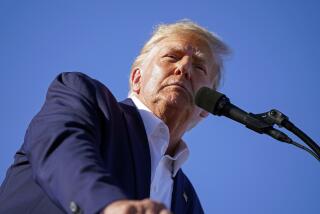Stock Fraud Now a Topic of Global Concern : Wall Street’s Scandals Prompt More Nations to Crack Down on Insiders
NEW YORK — From the Champs Elysees to the Japanese Parliament to Hong Kong’s waterfront stock market, authorities suddenly are prosecuting securities frauds that had been ignored, overlooked or condoned for years.
The enforcement campaigns have led to embarrassing scandals in France, Japan, Hong Kong, Mexico and elsewhere for crimes that range from profiteering on inside information to bribery and embezzlement.
To many U.S. securities law specialists, an intriguing common thread among these crackdowns is their coincidental timing.
Some experts believe that the highly publicized insider trading scandal on Wall Street has jolted foreign governments into scrutinizing sleazy practices in their own back yards.
“I think what’s been happening in the United States in the last five years has caused countries like France and Japan to beef up enforcement efforts in terms of securities regulation,” said William Tyson, a legal studies professor at the University of Pennsylvania’s Wharton business school.
‘Markets Are Growing’
Louis Loss, a Harvard Law School professor who has been consulted by foreign governments in drafting securities regulations, said many were several decades behind the United States in anti-fraud enforcement and only now were grappling with the severity of white-collar crime.
Part of the reason, Loss speculated, is “they’ve read about the financial scandals in our country.”
He also said they’re beginning to understand the necessity of at least trying to show investors that their markets are fair, because “you’re not going to play cards with me if I’ve got a marked deck.”
Others said the explosive worldwide expansion of the securities industry over the past several years, coupled with quantum leaps in communications technology that make cross-border trading easy, have forced many governments to toughen previously lax anti-fraud laws.
“We’ve seen more scandals because the markets are growing,” said Michael Mann, associate director for international affairs at the Securities and Exchange Commission’s enforcement division in Washington.
“The bottom line is you can trade in any market now from anywhere in the world and get your money to that market to close the deal,” he said.
To be sure, insider trading, manipulation and other shady market practices long deemed illegal in this country remain widespread in many parts of the non-Communist world.
Likened to Dodge City
In Britain, stock prices of companies targeted for takeovers often rise sharply at least one month before the official public announcements of deals, although insider trading has been illegal since 1980.
In West Germany, where insider trading is not only tolerated but a term for insider doesn’t exist in the language, stock prices regularly rise before improved earnings reports.
Switzerland, historically a haven for the profits of illegal financial dealings because of tough bank-secrecy laws, made insider trading a crime only last July.
In Hong Kong’s freewheeling stock exchange, which many trading professionals have likened to the Dodge City of international securities markets, conflicts of interest are said to be a way of life.
It was the only exchange to shut down completely for four days after the October, 1987, crash. Eight market officials, including former Chairman Ronald Li, were arrested later on charges of taking bribes.
Things aren’t much better in Mexico City, where earlier this month prosecutors arrested four top brokers and interrogated dozens more in connection with widespread fraud allegations that range from insider trading to sale of phony securities. Almost all of Mexico’s 24 registered brokerage houses have been implicated, and securities regulators have promised tough new rules.
Japan, home to the biggest stock market, modeled its postwar laws on securities fraud after those in the United States but rarely enforced them. One reason, said Tyson, is “the Japanese never felt insider trading was wrong.”
More to Read
Sign up for Essential California
The most important California stories and recommendations in your inbox every morning.
You may occasionally receive promotional content from the Los Angeles Times.










